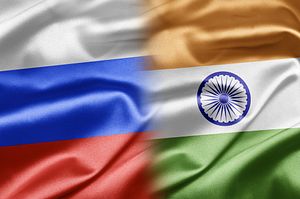India and Russia have long been close allies. During the Cold War, India was generally close to the Soviet Union, despite its official stance of non-alignment. In the past decade, India has moved closer to the United States, but this has not come at the expense of its relations with Russia. There are, ultimately, numerous limiting factors in the Indian relationship with the United States, including the ruling Bharatiya Janata Party’s (BJP) ideological distance from the West and U.S. President Barack Obama’s relative indifference towards maintaining a close relationship with India. On the other hand, both Russia and India have stood by each other at difficult moments.
As such, India still considers Russia a more consistent and dependent partner. India has backed Russia on a variety of issues that the United States has opposed, including supporting Russia’s interests in Ukraine. India, along with the other BRICS nations, showed remarkable bonhomie and camaraderie with Russia on this issue. Close ties between the two countries were also evidenced during the recent BRICS summit in Brazil. At the summit, Indian Prime Minister Narendra Modi noted that “if you ask anyone among the more than one billion people living in India who is our country’s greatest friend, every person, every child knows that it is Russia.”
India’s continued ties with Russia and support of Russian positions in the international arena demonstrate that India’s world view and goals are often very different from the West’s. Despite being a liberal democracy, India’s narrative often does not fully buy into the current liberal world order due to native currents in Indian thinking and a post-colonial wariness of the West. India’s positions at international forums are often closer to the major powers that are essentially opposed to the liberal world order led by the United States– including Russia, China, and sometimes Iran.
However, there are many stumbling blocks for India’s involvement with this informal non-Western grouping. The main one is India’s wariness towards China. While Russia has grown increasingly close with China, India still distrusts China due to an unresolved border dispute and rivalry over influence in Asia. However, China has recently begun to reach out to India because, like Russia, it believes that a truly Asian bloc is only fully possible with India’s cooperation. China has made the first move by inviting India to attend the APEC summit in Beijing, this November, one-upping the United States.
The Russia and India Report suggests that Russia is behind this recent change in China’s attitude towards India. Russia believes that with both India and China on board, it will be easier to set up a pan-Asian bloc that can stand up to the West. India views Russia as a trusted partner that could bridge the divide between China and India without neglecting Indian interests. Additionally, both Russia and China have recently indicated that they want India to play a larger role and perhaps even become a full member of the Shanghai Cooperation Organization (SCO). Russia has long advocated this position and it is likely that it has persuaded China to back greater Indian involvement with the SCO. India will probably need Russian support in the future if it is to persuade China to back its bid for a permanent seat in the United Nations Security Council.
Despite these improvements between India and China, it is unlikely that the two countries will see eye to eye anytime soon. While this may spur the U.S. and India to develop better ties in the future, India is still likely to remain closer with Moscow. If any country can bridge relations between China and India, it is likely to be Russia, the closest thing India has to an all-weather friend.

































